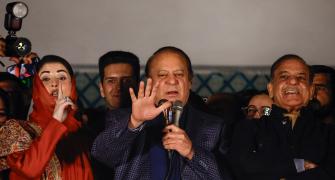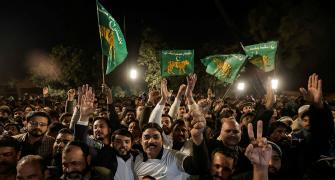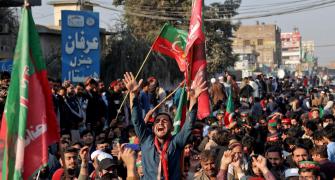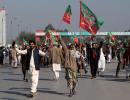Asif Ali Zardari was overwhelmingly elected as the 14th President of Pakistan on Saturday, becoming the only civilian President of the coup-prone country for a second time.

Zardari, the co-chairperson of the Pakistan Peoples Party (PPP), was the joint candidate of the ruling alliance of the PPP and the Pakistan Muslim League-Nawaz (PML-N).
His rival, Mahmood Khan Achakzai, is the head of his Pashtoonkhwa Milli Awami Party (PkMAP).
He was fielded by jailed former prime minister Imran Khan's Pakistan Tehreek-e-Insaf (PTI) party and backed by the Sunni Ittehad Council (SIC).
'Asif Ali Zardari is the first civilian president in the history of Pakistan who was elected for a second term,' the PPP posted on X soon after the election results were announced by the Election Commission of Pakistan (ECP).
He is expected to be sworn in on Sunday.
Zardari, 68, received 255 votes while his 75-year-old opponent got 119 votes in the National Assembly and the Senate.
The new president was elected by the electoral college of the newly elected members of the National Assembly and the four provincial assemblies, which formed the electoral college.
In the Sindh Assembly, where Zardari's PPP is at the helm, he bagged 58 votes while he also swept the Balochistan Assembly votes bagging all the 47 votes polled there.
In the Punjab assembly where the PML-N has formed the government, Zardari polled 43 votes while Achakzai got 18 votes.
In the Khyber Pakhtunkhwa assembly, where SIC/PTI has the government, Achakzai got 41 votes while Zardari received just 8.
"The total number of seats in the electoral college was 1,185 out of which 92 were vacant [...]," the ECP said. "The remaining 1,093 voters were to exercise their right to vote."
The election commission highlighted that 1,044 votes were cast of which nine were declared invalid.
"Thus, the total number of valid votes cast is 1,035," it said.
A businessman-turned-politician, Zardari is the husband of slain Pakistan prime minister Benazir Bhutto.
Zardari has been haunted by his shady past due to his alleged involvement in cases of mega corruption during the two terms of his wife as prime minister, when he earned the derogatory nickname of 'Mr 10 per cent' for allegedly getting his share of bribes in development projects.
He was implicated in many cases of corruption and spent several years behind bars, even facing custodial violence, but he was neither convicted nor lost his trademark smile, and, ultimately, he was cleared in all cases.
As he starts his second term in office, the country faces a battered economic and political system with a greater need for reconciliation than any time before, and Zardari's innate ability to bring people with clashing ideas to the table would be put to the test.
He may have to play a role in bringing about a reconciliation between the new government and jailed former prime minister Imran Khan's Pakistan Tehreek-e-Insaf party which has claimed that their mandate was stolen in the February 8 elections.
Zardari would replace the incumbent Dr Arif Alvi, whose five-year term ended last year.
However, he has continued since the new electoral college was not yet formed.
Achakzai is the head of his Pashtoonkhwa Milli Awami Party (PkMAP) and was contesting from the platform of the Sunni Ittehad Council (SIC), which came to prominence after independent candidates backed by Khan's Pakistan Tehreek-e-Insaf (PTI) joined it.
Achakzai, after losing the presidential election to Zardari, said that the presidential election was generally fair.
"The most unusual thing about this election was that the first time it has happened votes were neither bought nor sold," he said while speaking to reporters in Islamabad.
Achakzai also requested PML-N supremo Nawaz Sharif to tell the saner elements in his party to control the charged political environment.
"You (Nawaz) may not like your opponents but a huge population of the country has voted for them," he said, referring to the fact that independents backed by Khan's PTI won the maximum number of votes in the National Assembly in the elections.
The fractured mandate resulted in a hung Parliament.
Prime Minister Shehbaz Sharif congratulated Zardari on securing the position of President for the second term.
The prime minister acknowledged that the elected members of the National Assembly, Senate, and the four provinces had demonstrated their confidence in Zardari through their votes.
Shehbaz expressed confidence that President-elect Zardari would serve as a symbol of the federation's strength, emphasising the anticipation that Zardari would discharge his constitutional duties with diligence and commitment.
He noted that Zardari's election marked a continuation of democratic values, emphasising the commitment of coalition parties to collaborate for the development and prosperity of Pakistan.










